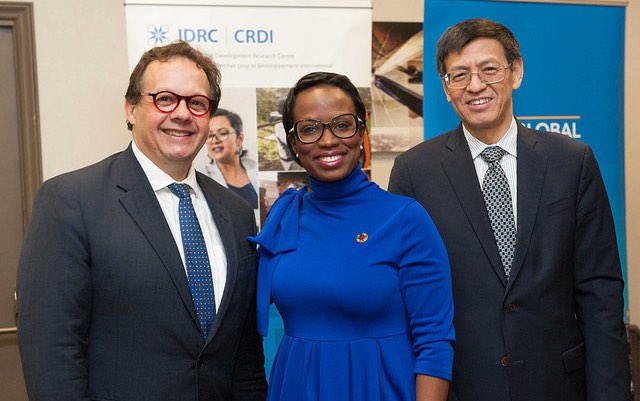“To achieve gender equality, we need to address social and economic power imbalances—especially for rural women who often face exclusion, vulnerability to exploitation, harmful practices, biases, and even conflict and violence,” Celina Caesar-Chavannes, Parliamentary Secretary to Canada’s Minister of International Development and La Francophonie, said at the May 1 event, Canadian perspectives on the 2018 Global Food Policy Report.
Co-organized by IFPRI and International Development Research Centre (IDRC) with collaboration from Global Affairs Canada (GAC), the event focused on how current trends in food security, agriculture, migration, and other themes covered in the 2018 Report are impacting women around the world.
While women play key roles as engines of growth and development for agriculture in many countries, IDRC president Jean Lebel lamented lackluster efforts around the world to integrate women into agricultural decision making and cautioned, “without women in agriculture we would be nowhere.”
IFPRI Director General Shenggen Fan agreed. “Women need access to assets, extension services, political voices, and associations to empower themselves,” he said. “We must ensure that women are reflected in all topic areas—trade, investment, knowledge sharing, migration, etc.—included in this year’s Report.”
Focusing on Chapter Two, on challenges to the global food system, Faris Ahmed, director of Policy & Campaigns at USC Canada, described the principles he would like a globalized food system to uphold: A rights-based approach to food, land, seeds and production resources; strong and inclusive governance that puts smallholder farmers and food producers at the center of policy thinking; a system that builds a significantly lower carbon footprint approach to agriculture; and one that nourishes and co-creates both locally and globally, including networks of local food systems.
The Report also explores conflict as a major contributor to global hunger in 2017. Canada has responded to this problem as a top humanitarian donor, and also by emphasizing the important role of women in peace and security initiatives, according to Sue Szabo, GAC director general of Food Security and Environment. Engaging women in this way is essential to achieve better nutrition outcomes for families, Szabo said.
Leveraging the role that women play in the economy can also help in preventing conflict, Caesar-Chavannes said. “Canada’s new trade agreements factor in the power and potential of women and girls,” she noted, adding she is proud to support the WTO’s Joint Declaration on Trade and Women’s Economic Empowerment.
These efforts are part of the Canadian government’s multipronged approach to policy, Szabo said. Human dignity is a key priority, she said, and the most effective way officials see to achieve development goals includes focusing Canada’s Feminist International Assistance Policy on the poorest and most vulnerable and on promotion of gender equality and the empowerment of women and girls. But, she said, “we need the evidence for a feminist approach.”
Enter IFPRI, whose mission is to provide research-based policy solutions that sustainably reduce poverty and end hunger and malnutrition. Senior Research Fellow Agnes Quisumbing presented the pilot version of the Project-Level WEAI, an adaptation of the Women’s Empowerment in Agriculture Index (WEAI)—a tool that development projects can use to assess their impacts on women in the agricultural sector and design empowerment strategies. She also emphasized the importance of data consistency: Civil society organizations and governments should use the same indicators and metrics to generate evidence and improve understanding of which strategies work best to help women empower themselves.
Canada’s representatives on the panel presented an impressive range of approaches in the country’s efforts to advance the fight to end extreme poverty and hunger and improve global nutrition security. Now, they said, focus is on how to make these approaches work better for underserved women and girls. Partnerships with organizations like IFPRI and CGIAR are playing a key role in this phase. Quisumbing’s conclusion—“projects and policies create opportunities, they don’t empower women—women empower themselves”—served as a reminder of what these efforts can help to enable women to do.
Katarlah Taylor is an IFPRI Senior Events Specialist.







